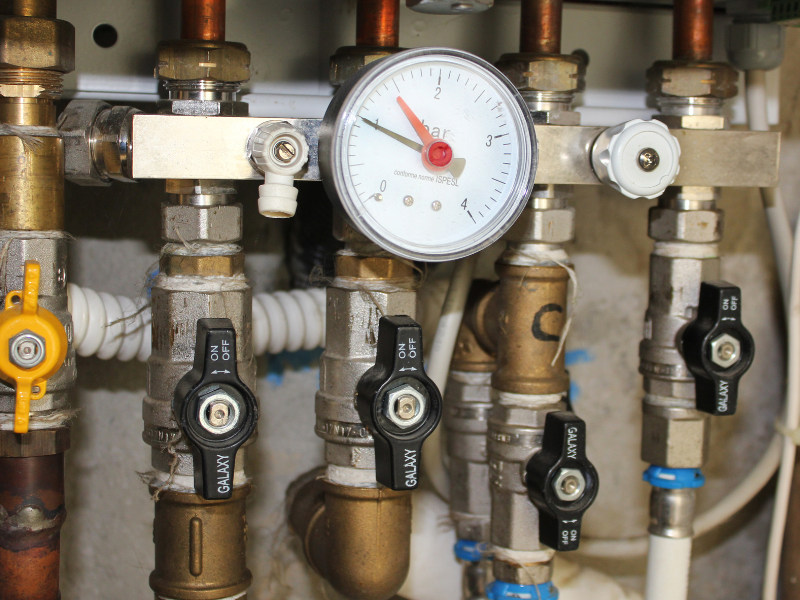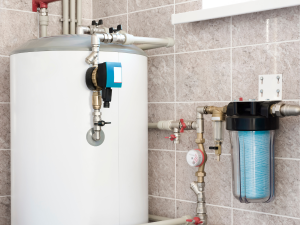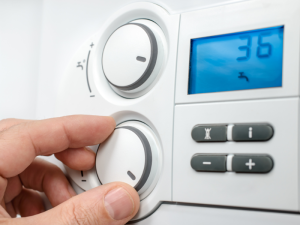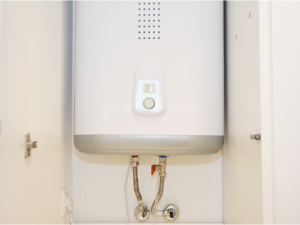Whether heating your home or building, a boiler is an excellent option. It uses water to create heat, which is then circulated throughout the building.
However, boilers can be temperamental, and one common issue is high boiler pressure. High pressure can cause damage to your boiler, as well as your pipes, so it’s important to know how to reduce it.
In this blog post from our team members at Clover Contracting, we’ll discuss the causes of boiler pressure, how to reduce boiler pressure, and what to do if this situation happens to you or a loved one.
4 Causes of High Boiler Pressure
There are several reasons your boiler pressure may be too high. Here are some of the most common:
- Faulty Pressure Relief Valve: The pressure relief valve is designed to release pressure if it gets too high. If the valve is faulty, it may not release pressure, causing it to build up in the boiler.
- Blocked Pressure Relief Pipe: The pressure relief pipe is the part that carries the excess pressure away from the boiler. If it becomes blocked, the pressure will have nowhere to go, causing it to build up in the boiler.
- Expansion Vessel Issues: The expansion vessel absorbs any excess pressure that may occur as the water in the boiler heats up. If it’s faulty, it won’t be able to do this, causing the pressure to rise.
- Issues with the Pressure Gauge: The pressure gauge tells you the pressure of the boiler. If it’s faulty, it may give you a false reading, showing that the pressure is higher than it actually is.
Fun Fact From the Experts
The first steam engine that used high pressure was built in 1804 by British engineer Richard Trevithick. The engine used high-pressure steam to power a locomotive, and it was the first locomotive to successfully run on rails. This breakthrough in high-pressure steam technology revolutionized transportation and helped pave the way for the Industrial Revolution, and the boilers we still use today.
Pressure Too High On Boiler | Potential Consequences
So, what happens when the pressure on your boiler is too high? Here are some potential consequences:
- Damage to the Boiler: When the pressure on your boiler is too high, it can cause damage to the boiler itself. The excess pressure puts a strain on the internal components, such as the heat exchanger and pump.
Over time, this can cause these components to wear down or break, leading to expensive repairs. In extreme cases, high pressure can cause the boiler to explode, which is extremely dangerous and can be fatal.
- Noise: High pressure can cause your boiler to make strange noises. These can include whistling, banging, or gurgling sounds. The noises are caused by the excess pressure in the pipes and can be a sign that your boiler is struggling to cope with the pressure. If you hear any strange noises coming from your boiler, it’s important to investigate the cause.
- Leaks: High pressure can also cause leaks in your pipes or boiler. The pressure can cause joints to loosen or pipes to burst, leading to water damage and potential mold growth.
Leaks can also cause your boiler to lose pressure, which can affect its performance and efficiency. If you notice any signs of leaks, such as damp patches or water stains, it’s important to address the issue as soon as possible to prevent further damage.
High boiler pressure can also cause your heating bills to skyrocket. When the pressure is too high, your boiler has to work harder to circulate the hot water, which can lead to increased energy usage. This can cause higher heating bills and decreased efficiency.
Is Your Hot Water Boiler Pressure Too High?
High boiler pressure can cause serious damage to your boiler and pipes, as well as noise and leaks. It’s important to reduce the pressure if it’s too high, including bleeding your radiators, checking the pressure relief valve and pipe, and checking the expansion vessel and pressure gauge.
If these steps don’t work, it’s time to call in a professional. And for hot water boilers, it’s important to check the expansion tank, pressure-reducing valve, and thermostat as well. By taking these steps and performing regular maintenance, you can help ensure your boiler runs smoothly and safely.
5 Tips from Experts on How to Reduce Boiler Pressure
If you’ve determined that your boiler pressure is too high, here are some steps that professionals can take to reduce it:
- Bleed Your Radiators: One of the most common causes of high boiler pressure is trapped air in the radiators. When the air gets trapped, it can prevent the hot water from circulating properly, leading to a buildup of pressure. Bleeding your radiators will release any trapped air, allowing the water to flow freely and reducing the pressure.
To bleed a radiator, you’ll need a radiator key, which can be purchased at most hardware stores. Simply insert the key into the valve at the top of the radiator and turn it counterclockwise. You should hear a hissing sound as the air is released. Once the water starts coming out, you can close the valve.
- Check the Pressure Relief Valve: The pressure relief valve is an important safety feature that releases pressure from the boiler if it gets too high. If the valve is faulty, it can cause the pressure to rise. To check the pressure relief valve, you’ll need to locate it on your boiler.
It’s usually a small lever or button located near the top of the boiler. With the boiler off, lift the lever or push the button to release some of the pressure. If water comes out, the valve works correctly. If nothing happens, you may need to replace the valve.
- Check the Pressure Relief Pipe: The pressure relief pipe is a small pipe that runs from the pressure relief valve to the outside of your home. Its purpose is to direct any released pressure away from the boiler and your home.
If the pipe is blocked, it can cause the pressure to rise. To check the pressure relief pipe, locate it on the outside of your home and make sure it’s not blocked by debris or anything else.
- Check the Expansion Vessel: The expansion vessel is another important component of your boiler that helps regulate the pressure. It’s a small tank usually near the boiler. If the expansion vessel is faulty, it can cause the pressure to rise.
To check the expansion vessel, you’ll need to turn off the boiler and let it cool down. Then, locate the vessel and check the pressure using a tire pressure gauge. The pressure should be around one bar. If it’s too low or too high, you may need to adjust or replace the vessel.
- Check the Pressure Gauge: The pressure gauge on your boiler gives you a visual sign of the current pressure. If the gauge is not giving an accurate reading, it can cause you to think the pressure is too high when it’s not.
To check the pressure gauge, turn off the boiler and let it cool down. Then, locate the gauge and check it against a known accurate pressure gauge. If it’s not giving an accurate reading, you may need to replace the gauge.
What You Can Do if Your Boiler Pressure is Too High
If you’ve tried the above steps and your boiler pressure is still too high, it’s time to call in a professional. An HVAC engineer will diagnose the issue and make the repairs. They can turn an arduous DIY project into a quick fix and save you the strain. Experts in the field:
- Check the Expansion Tank: Hot water boilers have an expansion tank that helps absorb excess pressure. Make sure it’s working correctly.
- Check the Pressure Reducing Valve: Hot water boilers also have a pressure-reducing valve that regulates the pressure of the incoming water supply. If this valve is faulty, it can cause the pressure to rise.
- Check the Thermostat: If the thermostat is set too high, it can cause the boiler to overheat, leading to high pressure. Make sure the thermostat is set to the temperature.
It’s crucial to remember that regular maintenance can help prevent high boiler pressure. This includes annual boiler servicing and checking the pressure gauge regularly. Our member arrangement can help you with ongoing solutions, so you can have real peace of mind.
Final Thoughts
High boiler pressure can have serious consequences for both your home and your wallet. From damage to the boiler and pipes to increased noise and potential leaks, it’s important to take action if you notice your boiler pressure is too high.
Fortunately, there are several steps you can take to reduce the pressure, such as bleeding your radiators, checking the pressure relief valve and pipe, inspecting the expansion vessel, and ensuring that the pressure gauge is giving you an accurate reading.
It’s useful to remember that if you feel uncomfortable handling your boiler, it’s best to call in the experts to avoid any accidents or further damage. By monitoring your boiler pressure and taking action when necessary, you can ensure that your home stays safe and warm all year round.




